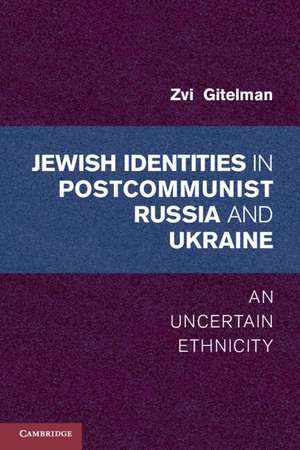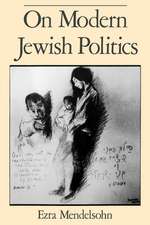Jewish Identities in Postcommunist Russia and Ukraine: An Uncertain Ethnicity
Autor Zvi Gitelmanen Limba Engleză Paperback – 14 oct 2012
| Toate formatele și edițiile | Preț | Express |
|---|---|---|
| Paperback (1) | 322.12 lei 6-8 săpt. | |
| Cambridge University Press – 14 oct 2012 | 322.12 lei 6-8 săpt. | |
| Hardback (1) | 532.00 lei 6-8 săpt. | |
| Cambridge University Press – 14 oct 2012 | 532.00 lei 6-8 săpt. |
Preț: 322.12 lei
Nou
Puncte Express: 483
Preț estimativ în valută:
61.64€ • 67.22$ • 51.97£
61.64€ • 67.22$ • 51.97£
Carte tipărită la comandă
Livrare economică 24 aprilie-08 mai
Preluare comenzi: 021 569.72.76
Specificații
ISBN-13: 9781107608733
ISBN-10: 1107608732
Pagini: 379
Ilustrații: 10 b/w illus. 25 tables
Dimensiuni: 155 x 234 x 21 mm
Greutate: 0.52 kg
Ediția:New.
Editura: Cambridge University Press
Colecția Cambridge University Press
Locul publicării:New York, United States
ISBN-10: 1107608732
Pagini: 379
Ilustrații: 10 b/w illus. 25 tables
Dimensiuni: 155 x 234 x 21 mm
Greutate: 0.52 kg
Ediția:New.
Editura: Cambridge University Press
Colecția Cambridge University Press
Locul publicării:New York, United States
Cuprins
1. Ethnicity and identity; 2. The evolution of Jewish identities; 3. Soviet policies and the Jewish nationality; 4. Constructing Jewishness in Russia and Ukraine; 5. Judaism and Jewishness: religion and ethnicity in Russia and Ukraine; 6. Becoming Soviet Jews: friendship patterns; 7. Acting Jewish; 8. Anti-Semitism and Jewish identity; 9. Identity, Israel, and immigration; 10. Ethnicity and marriage; 11. Polities, affect, affiliation, and alienation; 12. Conclusion.
Recenzii
“This is a learned and thought-provoking book, written by the foremost scholar on Soviet and post-Soviet Jewry. In it, Gitelman argues that the identity of post-Soviet Jews is purely ethnic and is divorced from the Jewish religion, Hebrew and Yiddish language, and Jewish ‘thick culture.’ As such, it is a form of Jewish identity unprecedented in history, and radically different from that of American Jews. Based on painstaking fieldwork, and buttressed by Soviet Jewish history, social theory, and comparative studies, Gitelman probes the challenges that post-Soviet Jewish identity both poses and faces.” – David E. Fishman, Jewish Theological Seminary of America
“Measuring ethnicity and identity are difficult tasks for social scientists, and in the case of the Jews of the former Soviet Union it is a particularly daunting task because of the efforts of the Soviet government to change the identity of Soviet Jews from one that was religiously based to one that was based on ethnicity. Zvi Gitelman has done a masterful job of dealing with this issue, and his book is highly recommended for anyone interested in the fate of the Jews of the former Soviet Union.” – Robert O. Freedman, Johns Hopkins University
“Zvi Gitelman has produced yet another definitive monograph. Based on an impressive number of surveys, in-depth interviews, and statistical data, Jewish Identities in Postcommunist Russia and Ukraine uncovers the process of many transitions and transformations of the Soviet Jews after the collapse of the Soviet Union. Meticulous analysis, wide scope of research, and far-reaching conclusions ultimately make this study a must-read for everyone in the field of Soviet and post-Soviet studies, and contemporary Jewish politics.” – Anna Shternshis, University of Toronto
“Gitelman's book goes much beyond in-depth historical and contemporary accounts of Jewish identities in postcommunist Russia and Ukraine. Its comparative perspective turns it into a broader study of Jewish identities worldwide, especially in the United States and Israel. It touches on the nature, fate, and future of the Jewish people. Gitelman sets a model for a scholarly analysis of ethnic identity, Jewish and non-Jewish. His book is a must-read for anyone interested in minority identity and ethnicity.” – Sammy Smooha, University of Haifa
“Measuring ethnicity and identity are difficult tasks for social scientists, and in the case of the Jews of the former Soviet Union it is a particularly daunting task because of the efforts of the Soviet government to change the identity of Soviet Jews from one that was religiously based to one that was based on ethnicity. Zvi Gitelman has done a masterful job of dealing with this issue, and his book is highly recommended for anyone interested in the fate of the Jews of the former Soviet Union.” – Robert O. Freedman, Johns Hopkins University
“Zvi Gitelman has produced yet another definitive monograph. Based on an impressive number of surveys, in-depth interviews, and statistical data, Jewish Identities in Postcommunist Russia and Ukraine uncovers the process of many transitions and transformations of the Soviet Jews after the collapse of the Soviet Union. Meticulous analysis, wide scope of research, and far-reaching conclusions ultimately make this study a must-read for everyone in the field of Soviet and post-Soviet studies, and contemporary Jewish politics.” – Anna Shternshis, University of Toronto
“Gitelman's book goes much beyond in-depth historical and contemporary accounts of Jewish identities in postcommunist Russia and Ukraine. Its comparative perspective turns it into a broader study of Jewish identities worldwide, especially in the United States and Israel. It touches on the nature, fate, and future of the Jewish people. Gitelman sets a model for a scholarly analysis of ethnic identity, Jewish and non-Jewish. His book is a must-read for anyone interested in minority identity and ethnicity.” – Sammy Smooha, University of Haifa
Notă biografică
Descriere
This book examines in depth post-Soviet Jews' attitudes toward religion, intermarriage, emigration, anti-Semitism and rebuilding Jewish life.













